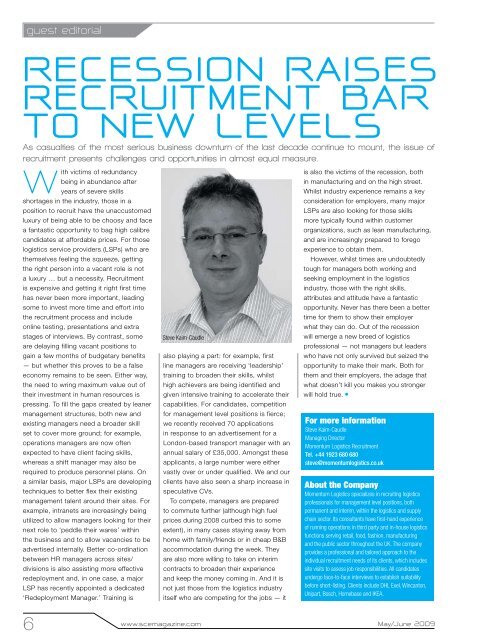w w w . s c e m a g a z i n e . c o m - Supply Chain Europe
w w w . s c e m a g a z i n e . c o m - Supply Chain Europe
w w w . s c e m a g a z i n e . c o m - Supply Chain Europe
You also want an ePaper? Increase the reach of your titles
YUMPU automatically turns print PDFs into web optimized ePapers that Google loves.
guest editorial<br />
recession rAises<br />
recruitment bAr<br />
to neW leVels<br />
As casualties of the most serious business downturn of the last decade continue to mount, the issue of<br />
recruitment presents challenges and opportunities in almost equal measure.<br />
With victims of redundancy<br />
being in abundance after<br />
years of severe skills<br />
shortages in the industry, those in a<br />
position to recruit have the unaccustomed<br />
luxury of being able to be choosy and face<br />
a fantastic opportunity to bag high calibre<br />
candidates at affordable prices. For those<br />
logistics service providers (LSPs) who are<br />
themselves feeling the squeeze, getting<br />
the right person into a vacant role is not<br />
a luxury … but a necessity. Recruitment<br />
is expensive and getting it right first time<br />
has never been more important, leading<br />
some to invest more time and effort into<br />
the recruitment process and include<br />
online testing, presentations and extra<br />
stages of interviews. By contrast, some<br />
are delaying filling vacant positions to<br />
gain a few months of budgetary benefits<br />
— but whether this proves to be a false<br />
economy remains to be seen. Either way,<br />
the need to wring maximum value out of<br />
their investment in human resources is<br />
pressing. To fill the gaps created by leaner<br />
management structures, both new and<br />
existing managers need a broader skill<br />
set to cover more ground; for example,<br />
operations managers are now often<br />
expected to have client facing skills,<br />
whereas a shift manager may also be<br />
required to produce personnel plans. On<br />
a similar basis, major LSPs are developing<br />
techniques to better flex their existing<br />
management talent around their sites. For<br />
example, intranets are increasingly being<br />
utilized to allow managers looking for their<br />
next role to ‘peddle their wares’ within<br />
the business and to allow vacancies to be<br />
advertised internally. Better co-ordination<br />
between HR managers across sites/<br />
divisions is also assisting more effective<br />
redeployment and, in one case, a major<br />
LSP has recently appointed a dedicated<br />
‘Redeployment Manager.’ Training is<br />
6<br />
Steve Kaim-Caudle<br />
also playing a part: for example, first<br />
line managers are receiving ‘leadership’<br />
training to broaden their skills, whilst<br />
high achievers are being identified and<br />
given intensive training to accelerate their<br />
capabilities. For candidates, competition<br />
for management level positions is fierce;<br />
we recently received 70 applications<br />
in response to an advertisement for a<br />
London-based transport manager with an<br />
annual salary of £35,000. Amongst these<br />
applicants, a large number were either<br />
vastly over or under qualified. We and our<br />
clients have also seen a sharp increase in<br />
speculative CVs.<br />
To compete, managers are prepared<br />
to commute further (although high fuel<br />
prices during 2008 curbed this to some<br />
extent), in many cases staying away from<br />
home with family/friends or in cheap B&B<br />
accommodation during the week. They<br />
are also more willing to take on interim<br />
contracts to broaden their experience<br />
and keep the money coming in. And it is<br />
not just those from the logistics industry<br />
itself who are competing for the jobs — it<br />
is also the victims of the recession, both<br />
in manufacturing and on the high street.<br />
Whilst industry experience remains a key<br />
consideration for employers, many major<br />
LSPs are also looking for those skills<br />
more typically found within customer<br />
organizations, such as lean manufacturing,<br />
and are increasingly prepared to forego<br />
experience to obtain them.<br />
However, whilst times are undoubtedly<br />
tough for managers both working and<br />
seeking employment in the logistics<br />
industry, those with the right skills,<br />
attributes and attitude have a fantastic<br />
opportunity. Never has there been a better<br />
time for them to show their employer<br />
what they can do. Out of the recession<br />
will emerge a new breed of logistics<br />
professional — not managers but leaders<br />
who have not only survived but seized the<br />
opportunity to make their mark. Both for<br />
them and their employers, the adage that<br />
what doesn’t kill you makes you stronger<br />
will hold true. •<br />
For more information<br />
Steve Kaim-Caudle<br />
Managing Director<br />
Momentum Logistics Recruitment<br />
Tel. +44 1923 680 680<br />
steve@momentumlogistics.co.uk<br />
About the Company<br />
Momentum Logistics specializes in recruiting logistics<br />
professionals for management level positions, both<br />
permanent and interim, within the logistics and supply<br />
chain sector. Its consultants have first-hand experience<br />
of running operations in third party and in-house logistics<br />
functions serving retail, food, fashion, manufacturing<br />
and the public sector throughout the UK. The company<br />
provides a professional and tailored approach to the<br />
individual recruitment needs of its clients, which includes<br />
site visits to assess job responsibilities. All candidates<br />
undergo face-to-face interviews to establish suitability<br />
before short-listing. Clients include DHL Exel, Wincanton,<br />
Unipart, Bosch, Homebase and IKEA.<br />
www.scemagazine.com may/June 2009



